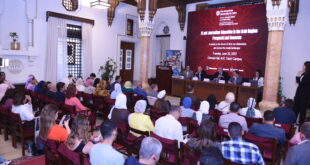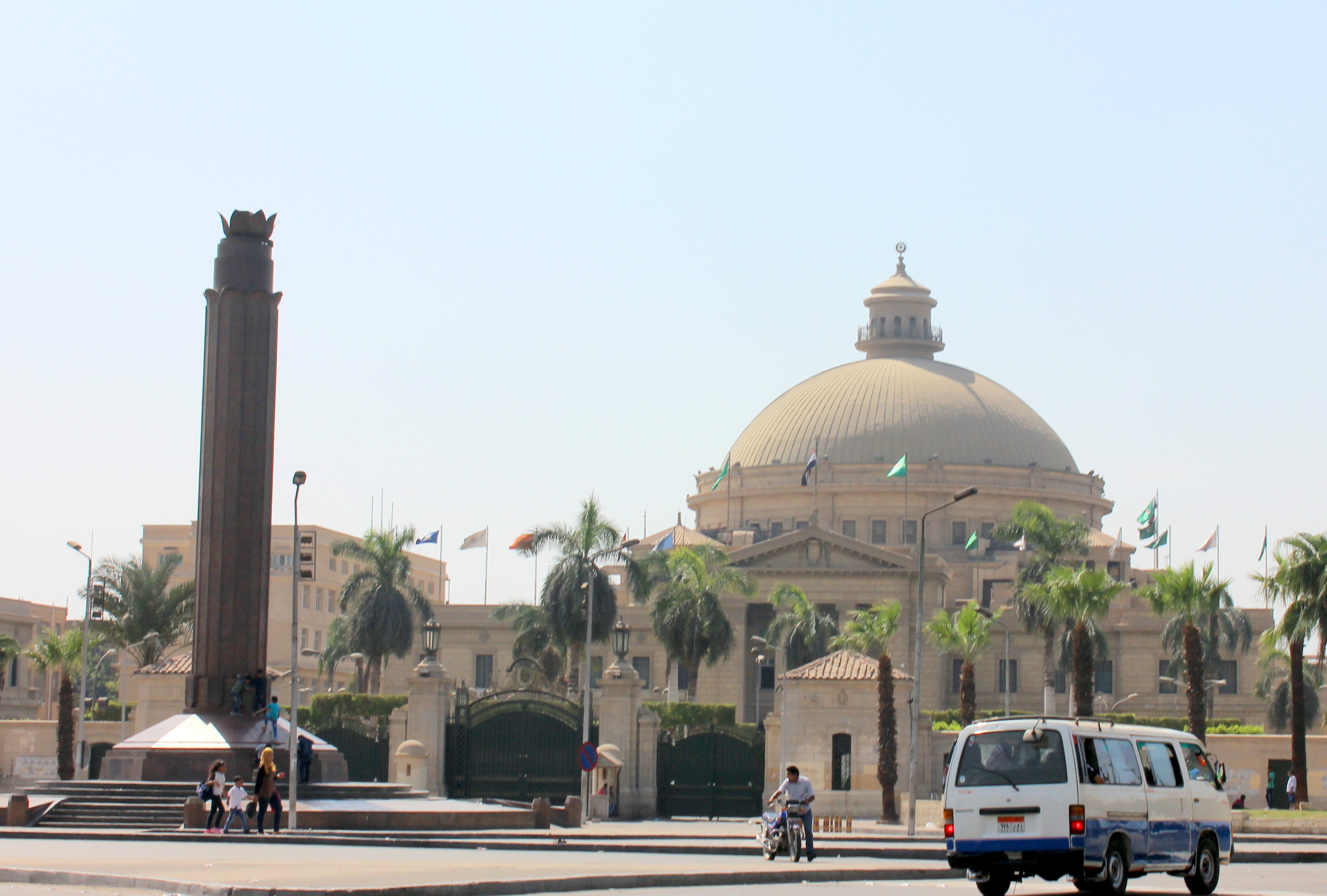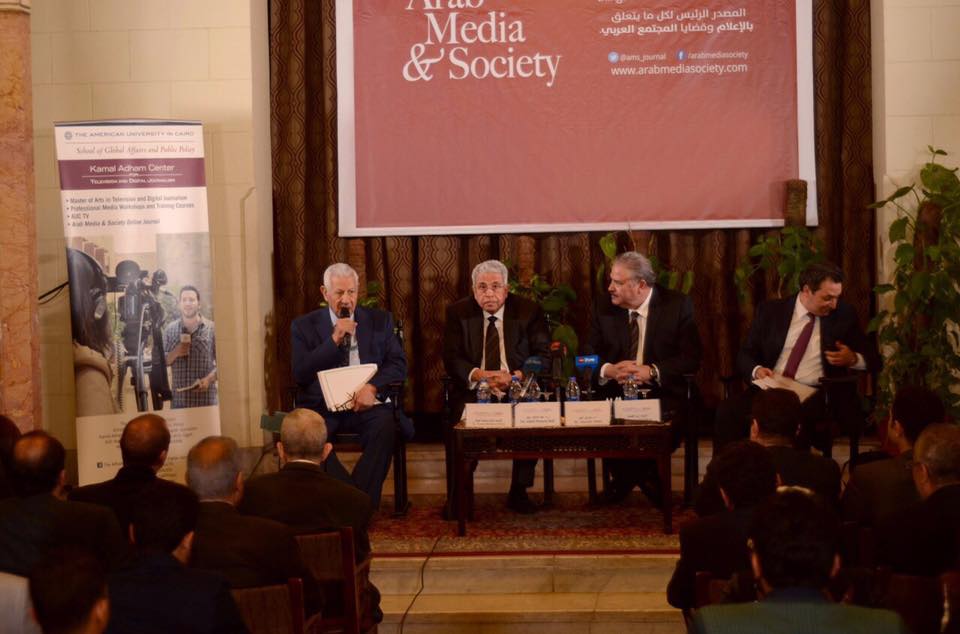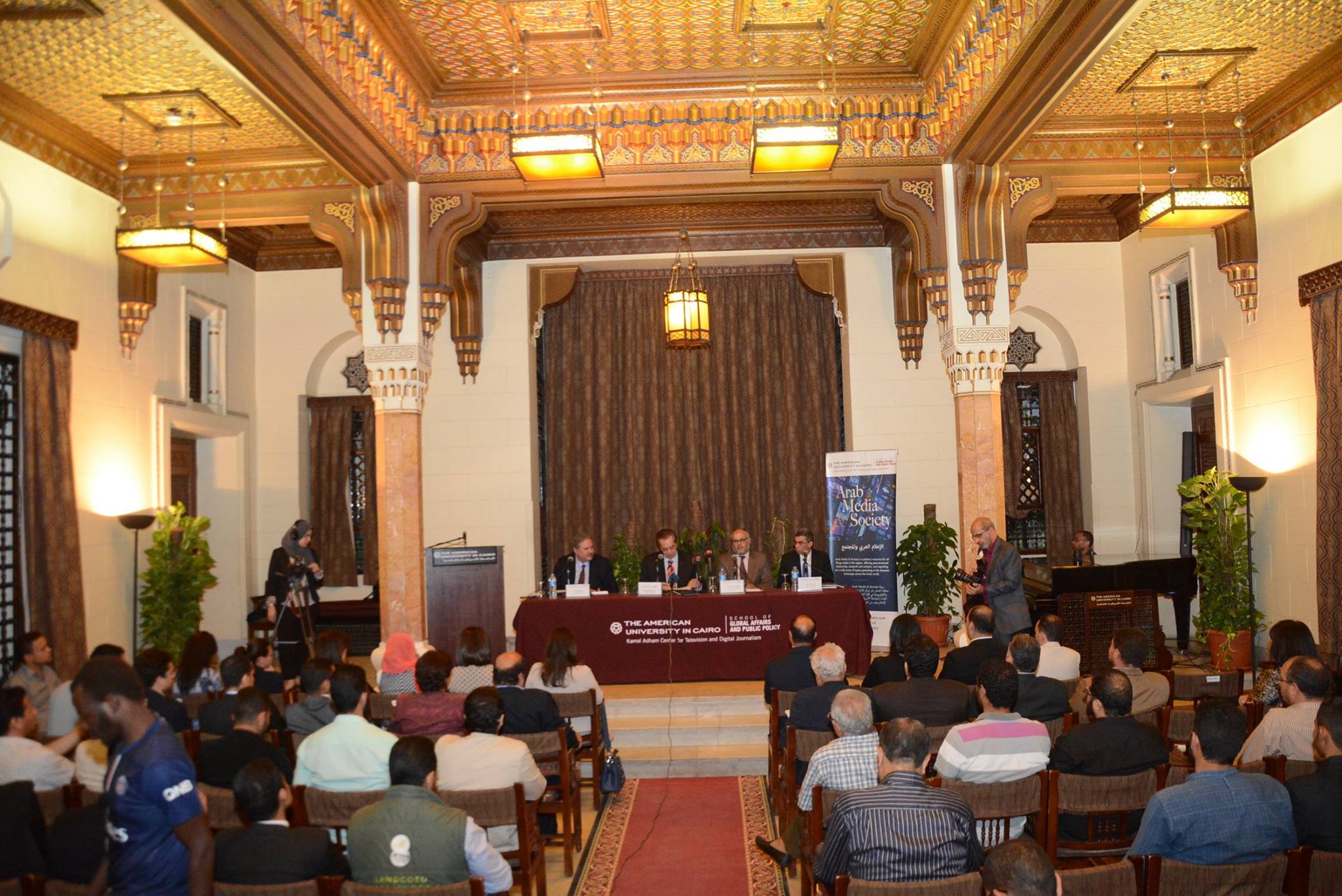The sixth annual conference of the Arab-US Association of Communication Educators (AUSACE) took place in Atlanta, Georgia, October 31 to November 3, 2001. The conference was hosted by Georgia State University and was co-sponsored by AUSACE; the Department of Communication, GSU; the Center for International Media Education; and the Middle East Center for Peace, Culture, and Development, Georgia State University. The theme of the conference was "The Economy of the Media in the New Middle East." Approximately 60 participants attended the meeting. The persons in attendance represented a broad diversity of disciplines and colleges and universities, as well as professionals from different media institutions worldwide.
Dr. Carl Patton, president of Georgia State University, and Dr. Fayez Kawassenah, president of Yarmouk University in Jordan, inaugurated the conference. Dr. Fayez Kawassenah gave the keynote speech at the opening ceremony.
One of the highlights of the conference was the roundtable discussion "Media and Politics: Arab and U.S. Perspectives," moderated by Ralph Wenge, CNN Executive Producer, and featuring Cynthia Tucker, editorial page editor at the Atlanta Constitution; Thomas Johnston, senior exchange specialist for the U.S. State Department and this author.
Key Issues
Participants from developing countries highlighted the problems with the economy of the media in the New Middle East. Attempts to provide information need to take into account the baseline reality of under-resourced media systems and the lack of adequate funding and finance. Many conference participants stressed the need to put the use of the new economic media models and their implementation in perspective.
Presentations and discussions at the conference were organized around the main areas for conference including: Media Economics and Social Responsibility; Media Globalization, Policies and Regulations; the Question of National Identity vs. Media Globalization; Global Media Ownership, Production, and Distribution; Media Literacy Meets the Global Marketplace; and Economics of Access to New Media and Technology.
A number of academics noted new developments in the UAE media systems as was introduced in the first session that was titled Nationalization of Media & Communication Industries in the United Arab Emirates, moderated by Carolyn Crimmins, Georgia State University, with Jack Barwind, Susan Ross, and Judy Turk, all from Zayed University, who gave excellent presentations describing the scenes of the communication industries in the UAE with specific reference to media education.
In the second session titled "Media Ownership Patterns: Production and Distribution," moderated by Frederick Vultee, University of Missouri-Columbia, a number of scholars also stressed the need to raise awareness of existing Arab media systems problems. The panelists mainly focused on the new patterns of ownership of the media and how it will affect production techniques and distribution methods. Speakers included Sujatha Sosale, Georgia State University, with his paper "Communication and Development in the International and Global 'Eras': Understanding Continuities and Changes"; and Mohamed el-Bendary, Louisiana State University, with his paper "The Mobilization of Power: Advertising and the Economic Effects of Cross-Media Ownership." Sabrina Freenay from Georgia State University presented "Rage Against the Regimes: National Sovereignty and Global Development." Doaa Darwish, Elisa Pierandrei, and Peggy Bieber-Roberts, all from the American University in Cairo, highlighted the importance of history in their paper "The Collective Memory of Cafe Riche's Illustrious Egyptian Cultural Elite."
The conference noted some tension between top-down national and international efforts and building local capacity and even demand, for good quality media systems, and the development of private media in different countries in the Arab world, the latter being crucial. Since different constituencies have clearly different needs, the third session that was titled "The Economy of the Media in the New Middle East," which Leonard Teel of Georgia State University moderated, focused on these issues. This particular session was a powerful one, where all the presenters focused on the economic dimension of media. Leo Gher, University of Zagreb, presented a paper "The End of the Communication Revolution: How Transnational Technologies Impact Global Economics." Robert Picard, Turk School of Economics and Business, delivered a paper "Development and Condition of Advertising Expenditures on the Arabian Peninsula." James Napoli, Western Washington University, dealt with the issue of beginning with local experiences and understandings of journalism training in his paper titled "The Political Economy of Journalism Training in the Age of Globalization." Ahmed Gody, from the Modern Arts and Sciences University in Cairo, gave his own perspective on media economics in his paper titled "The Economics of Using Comics and Animation in National Development in Egypt." The panelists agreed that there was much to learn from different experiences across sectors and disciplines, and the need for more sharing and exchange of lessons learned was recognized as important.
A focus on new media perhaps amplifies any benefits of media use, but there was a strong recognition of the continued importance of supporting traditional mass media. In the fourth session that was titled "Media Literacy and the Global Marketplace," moderated by Greg Lisby, Georgia State University, panelists debated different kinds of topics: Yousef Mohammed from Kuwait University discussed "Cellular Phone Use by Kuwait University Students"; Naila Nabil Hamdy, the American University in Cairo, described in her case study the "Islamic Cyberspace." Gilbert Fowler, Arkansas State University, and Ralph Berenger, the American University in Cairo, discussed "How Students Use the College Newspaper," and Serajul Bhuiyan, Alcorn State University, presented a paper on "Journalism in the Digital Age in the Middle East." Information and communication technology has been the greatest agent of change during the past century and promises to play an even more dramatic role in directing progress in the coming decades, Ahmed El Gody and Mahitab Ezz ElDin, from MSA, said in a presentation for their paper "Egyptian Journalists' Usage of the Internet in Their Profession."
It has been suggested that there is a crisis of national identity in the new world following the information and communication revolution represented by the Internet and transnational broadcasting. The fifth session titled "National Identity Versus Media Globalization," moderated by Serajul Bhuiyan, Alcorn State University, focused on these issues. Shahira Fahmy, University of Missouri, discussed in her paper the "Adaptation in the Egyptian Film Industry and National Identity." From Malaysia the same point was made by Zulkiple bin Abd. Ghani, University of Malaysia, who debated in his work "Arab Broadcasting: A Search for Islamic Identity." On the other hand, David Cheshier, Georgia State University, discussed in his paper the question "Is Economic Globalization Strengthening or Weakening?" Musa Gasimov, Baku State University, described "Azerbajani Press and National Identity," and Arthur Lizie, Bridgwater State University, presented the paper "The Battle over the Global Discourse: From Globalization to Media Imperialism to 'Guerilla Webfare.'"
Douglas Boyd, University of Kentucky, moderated the sixth session that was titled "National Identity versus Media Globalization." Adel Iskandar, University of Kentucky, presented excellent materials on his topic "Al-Jazeera, Hero or Heretic? Al-Jazeera as a Novel Arab Satellite Television Service." Will Jenkins, University of Kentucky, reviewed "Global News Wars: Government Interaction with the News Media in the Gulf War, the Kosovo Crisis, and the Palestine Conflict." Doaa Darwish, the American University in Cairo, gave a good description of thematic radio stations in Egypt in her paper "Development and Impact of the New Egyptian Thematic Radio Station." John Merrill, University of Missouri-Columbia, acted as the discussant for this session and had some excellent comments for the presenters.
In the following session titled "Media and Cultural Perspectives," moderated by Richard Welch of Mercyhurst College, Issam Mousa, Yarmouk University and Leonard Ray Teel, Georgia State University, presented the paper "The American People in the Eyes of Jordanian Communication Students: A Cross Cultural Study." Ghalib Shatnawi, Georgia State University, examined in his presentation "A Cultural Perspective of Honor Crimes in Jordan: Myth or Reality." Jabbar Al Obaidi, Bridgewater State University, discussed in his paper "The Transition from Cultural Nationalism to Local Patriotism in the Arab World." Rania Mohamed Ramada Ahmed from the American University in Cairo did a presentation "The Impact on Egyptian Children of Western Animated Characters Compared to Egyptian Animated Characters." Sam Hill, Georgia State University, gave the presentation "Reel Life along the Nile: An Analysis of the Current Critical Review on Cultural Reflections in Late Twentieth Century Egyptian Cinema."
The final session was "Copyright, Intellectual Property Protection, and Networking." Dina Ibrahim, University of Texas, presented paper "Copyright Law in the Digital Millennium: Recent Court Cases and Their Implications for Online Copyright Enforcement in the Middle East." Rasha Abdulla from the University of Miami examined "Arabic Music on the Internet: Copyrights or Copywrongs?" Mohammed el-Nawawy, University of West Florida, did his presentation on "Government and Governance of the Networked Age in the Arab World," and Makram Khoury-Machool, University of London, spoke on "The Globalization of the Media: The First Cyber War in the Middle East."
In the closing session of the conference, participants agreed that the core missions of media education systems (to educate, to train, to undertake research and, in particular, to contribute to the development of mass media in the Middle East and improvement of society as a whole), should be reinforced and further developed and expanded. Also, utilization of new information and communication technologies for the renewal of old media models is important by extending and diversifying delivery, and by making knowledge and information available to a wider public in the region. In addition, there was consensus among the conference participants on the general objective of privatization of the media and the introduction of new economic media models to replace the old ones, and that the new models should be cost-effectiveness.
The board of AUSACE said will publish complete transcripts for all papers presented at the conference, with the agreement of the authors. If it is handled as in other years, abstracts will be available within the next two to six months. Papers are also available from the authors that presented them. One of the important decisions of the board was to start a new biannual online academic journal representing the association, to be called the Journal of the Middle East Media.
 Arab Media & Society The Arab Media Hub
Arab Media & Society The Arab Media Hub




